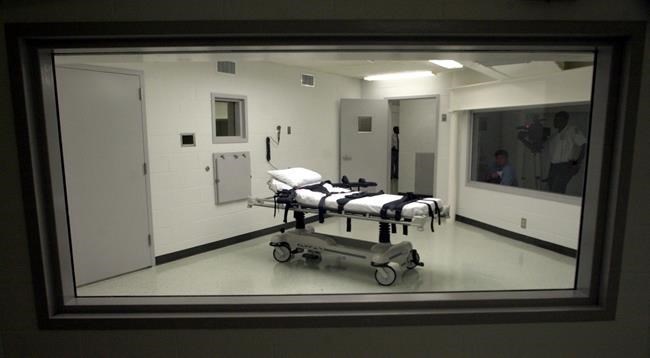
Advocates say masks made by the subsidiary of a Quebec-based company are being used for execution in the United States. Alabama's lethal injection chamber at Holman Correctional Facility in Atmore, Ala., is pictured on Oct. 7, 2002. Kenneth Smith, 58, is scheduled to be executed Jan. 25, 2024, at a south Alabama prison by nitrogen gas, a method that has never been used to put a person to death.
Image Credit: THE CANADIAN PRESS/AP
January 24, 2024 - 9:00 AM
MONTREAL - Masks made by the subsidiary of a Quebec-based company are being used for executions in the United States, justice advocacy groups say.
Alabama plans to execute inmate Kenneth Smith on Thursday by nitrogen hypoxia, in which breathable air is replaced with nitrogen gas, depriving the body of oxygen.
The mask and hose to be used, which typically function as a respirator, are made by Allegro Industries, according to U.S.-based non-profits Worth Rises and the Responsible Business Initiative for Justice. Allegro, located in South Carolina, is a subsidiary of Quebec-based Walter Surface Technologies, which in turn is partly owned by Toronto private equity firm Onex Corp.
“We don’t believe that anyone, any corporation, should be profiting off of death dealing," said Dana Floberg, director of corporate campaigns at Worth Rises.
“There’s an argument to be made that this is also inhumane because it qualifies as doing experimental testing on a human being.”
Smith, 58, would be the first inmate in the U.S. to face the untested method of capital punishment.
Earlier this month, the United Nations Human Rights Office said the method may cause serious suffering and warned that it "will likely violate the prohibition on torture and other cruel, inhuman or degrading punishment."
“We are concerned that nitrogen hypoxia would result in a painful and humiliating death,” UN experts said in a statement on Jan. 3. They comprise four special rapporteurs on execution, torture, mental health and the justice system: Morris Tidball-Binz, Alice Jill Edwards, Tlaeng Mofokeng and Margaret Satterthwaite, respectively.
As a mode of mammal euthanasia, nitrogen asphyxiation is acceptable only for pigs, according to the American Veterinary Medical Association. Other species should first be rendered unconscious "via an acceptable method," the 2020 guidelines state.
Alabama's approach includes no initial sedatives.
The companies have not responded to requests for comment.
Correctional authorities have found it increasingly difficult to obtain the chemicals needed for lethal injection due to pharmaceutical companies banning the use of their products for that purpose, prompting several states including Oklahoma and Mississippi to authorize nitrogen gas as a way to execute inmates on death row — though Thursday would be the first instance.
Some corporations are swearing off that method as well.
Airgas, the largest distributor of packaged gas in the U.S., said this month it would not provide nitrogen to Alabama prisons.
“Notwithstanding the philosophical and intellectual debate of the death penalty itself, supplying nitrogen for the purpose of human execution is not consistent with our company values,” said spokeswoman Kim Menard.
Last February, under pressure from activists and faith groups, Tennessee-based FDR Safety said it was withdrawing from a state contract to help Alabama develop the new execution protocol.
In 1989, Smith and another man were convicted in the murder-for-hire killing of a woman in northwestern Alabama.
Smith and John Forrest Parker were each paid US$1,000 to kill Elizabeth Sennett on behalf of her preacher husband, Charles Sennett, who was deeply in debt and aimed to collect the life insurance, prosecutors said.
After a 1996 retrial, Smith was again convicted of capital murder and sentenced to death by electrocution.
Parker was executed by lethal injection in 2010. Sennett died by suicide during the course of the murder investigation.
Smith has languished on death row for more than three decades. In 2022, prison officials with Alabama’s department of corrections botched a lethal injection, puncturing his body repeatedly over the course of several hours but failing to find a vein before the execution was called off.
On Jan. 10, a federal judge approved Smith’s execution by nitrogen hypoxia.
Last week, the state attorney general's office told federal appeals court judges that it is "the most painless and humane method of execution known to man."
But what exactly Smith will experience after the warden switches on the gas is unknown, some doctors and critics say.
“What effect the condemned person will feel from the nitrogen gas itself, no one knows,” Dr. Jeffrey Keller, president of the American College of Correctional Physicians, wrote in an email. “This has never been done before. It is an experimental procedure.”
Canada effectively abolished the death penalty in 1963, when governments began to commute all death sentences. Capital punishment for murder was banned via legislation in 1976, and the death penalty for any offence — spying for the enemy, for example — was outlawed in 1999.
The last execution in Canada occurred by hanging at Toronto’s Don Jail in December 1962.
— With files from The Associated Press
This report by The Canadian Press was first published Jan. 24, 2024.
Companies in this story: (TSX:ONEX)
Note to readers: This is a corrected story. A previous version misstated the method of Canada's final execution.
News from © The Canadian Press, 2024